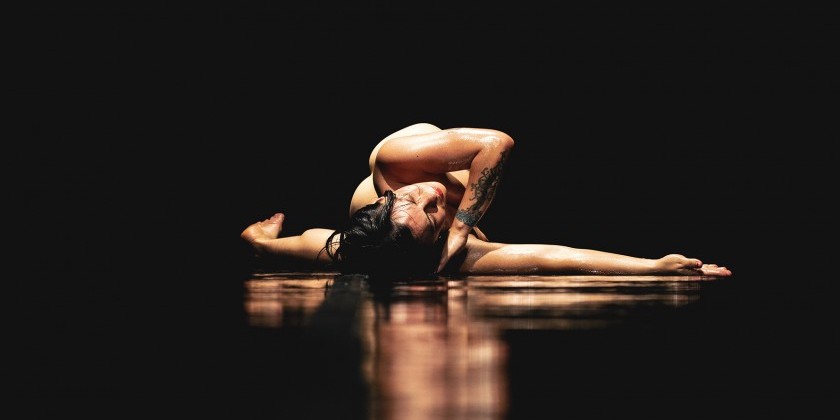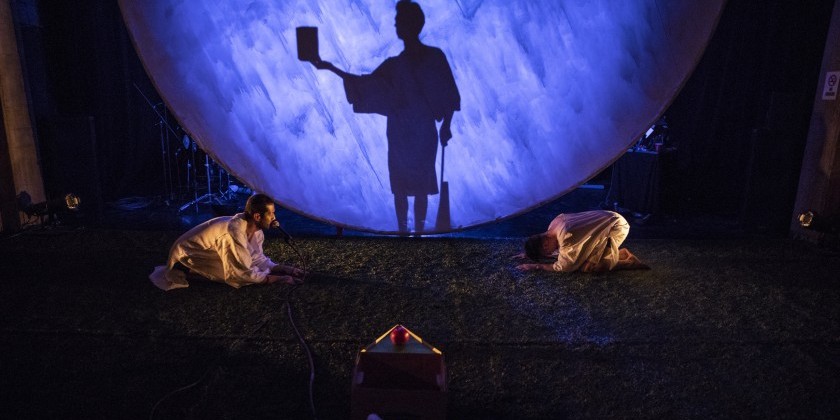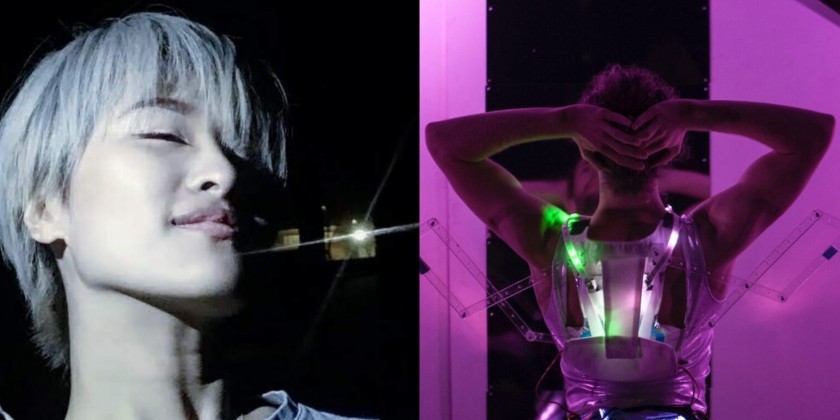IMPRESSIONS: Daina Ashbee’s “Serpentine” presented by American Realness in partnership with First Nations Dialogues, Global First Nations Performance Network and Consulate General of Canada in New York

January 10, 2018
Artistic direction and choreography by Daina Ashbee
Performance: Areli Moran Mayoral
Lighting design: Daina Ashbee and Areli Moran Mayoral
Music: Jean-Francois Blouin
Daina Ashbee's Serpentine is a work of immense power. The Canadian (Metís) artist's durational solo for performer Areli Moran Mayoral consists of a movement pass down a long, narrow stage. The performer is nude, and both she and the floor are coated in oil. Though the work can last up to two hours, this U.S. premiere was an hour and a half, with each pass lasting thirty minutes.
American Realness curator Ben Pryor and First Nations Dialogue leader Emily Johnson, greet the crowd outside the theater for a land acknowledgement and a content warning. Johnson honors Lenape elders and speaks about the socio-cultural flux of what is now known as New York City. She asks us to think about what actions we can take as guests on stolen and colonized land. Without saying so directly, she reminds us to think critically about the consumption of people and resources. Pryor issues a content warning, saying the work contains strong images. Since global violence escalates every day, the pictures of which litter our screens, it's hard to imagine what could prompt this caveat.

The audience sits in a long U-shape, like guests around a formal dinning room table, or a fashion runway. While stools stand against the back wall on either side, most people who don't secure a chair sit on the floor, in the narrow space between chairs and oiled marley.
Mayoral kneels at the far end of the stage, forehead on the ground, belly on thighs. Her hands reach back between her legs. She slides her knees apart, incrementally, until her whole torso rests on the ground. The oil reduces friction between her body and the floor, opening up possibilities for sinuous, fluid movement.
Mayoral slowly travels the length of the stage, staying low to the ground. It feels ancient, like the exact evolutionary moment when a creature first tried to walk on land. She makes simple shapes—shoulder bridges, quadruped crawling— but their continuity, and her concentration, is complex. The audience nearly holds its breath. When she reaches approximately two-thirds of the way down her path, Mayoral shifts into a belly-down, inchworm motion. She ripples from pelvis to head in a distinct forward trajectory, rapidly building in speed until she's rhythmically slamming her thighs and chest into the ground with each push forward. She gasps and chokes as she knocks out her own breath with the force of her movement.

The oil loses its sexiness and instead transmits the wet, slapping sound of Mayoral's body against the floor. Watching her is viscerally painful. The difference between Mayoral, onstage and naked, and the audience, shrouded in clothes and shadows, feels significant: No longer witnesses in solidarity, audience members become voyeurs in anticipation. As it turns out, both Johnson's meditation on care and responsibility and Pryor's content warning were warranted.
Eventually, Mayoral stands and walks steadily back to the end of the stage where she started. She wipes some oil from her body, re-braids her hair, and returns to her initial kneeling position. Then she starts the entire thing again. Each time she begins her violent inchworm sequence, a brief moment occurs in which it seems like she might not speed up. But she always does.
The impulse is to hold her down, smother her, make her stop — out of pity or fear, or both. To watch and do nothing is nearly unbearable. To look away feels like a betrayal of her commitment, and interference is out of the question. Only Mayoral knows whether the whimpers and fragmented words that escape her are part of a triumphant ritual, wrenching exorcism, or degrading spectacle.

Serpentine's namesake, the snake, references temptation and vulnerability, power and suffering — dualities that extend to a female person living in a white-supremacist capitalist patriarchy. Under such constraints, the line between what's done to someone, and what they do to themselves, blurs. Ashbee's choreography pushes Mayoral to the edge of what's bearable, for both the performer and the audience. It's Mayoral who chooses how hard to slam her body, how long to sustain the effort, but choices that lead to survival by way of self-harm are hardly choices at all. Serpentine excoriates the tension between femininity and free will, yet offers no comforting conclusion.















